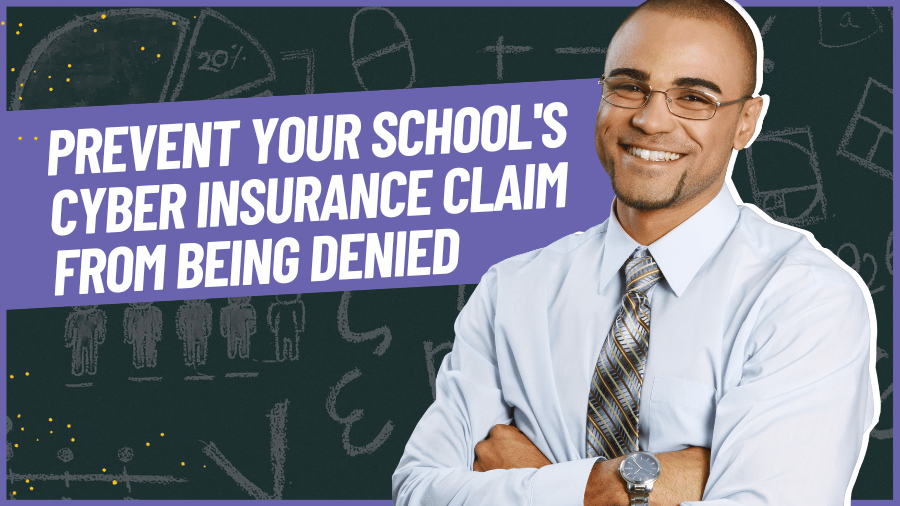Discover how specialized IT providers for K-12 schools can fortify cybersecurity, ensuring your cyber insurance policy remains your safety net.
As K-12 school leaders, you’re well aware of the growing importance of cybersecurity in today’s digital world. With the increasing reliance on technology for education, protecting sensitive data has become paramount. Cyber insurance is a crucial safety net, but many K-12 schools find their claims denied when they need it the most. In this article, we’ll explore why cyber insurance claims for K-12 schools often get denied and offer valuable tips to help schools find the right insurance broker who understands their unique needs.
Why Cyber Insurance Claims for K-12 Schools Often Get Denied
Before diving into the solutions, let’s understand the reasons behind the denial of cyber insurance claims for K-12 schools.
- Inadequate Coverage: One of the primary reasons for claim denial is insufficient coverage. Some schools opt for a one-size-fits-all policy without considering the specific risks associated with K-12 institutions. This leaves them vulnerable when a breach occurs that isn’t covered under their policy.
- Lack of Proper Documentation: Proper documentation is key when filing a cyber insurance claim. Schools often fail to maintain detailed records of their cybersecurity measures and incident response plans. Without this documentation, insurers may doubt the severity of the breach and deny the claim.
- Delayed Reporting: Timeliness is crucial in the event of a cyber incident. Delayed reporting of a breach can lead to claim denial. Schools need to establish clear reporting procedures to ensure they notify their insurers promptly.
- Inadequate Risk Assessment: Many K-12 schools underestimate their cyber risks. Without a comprehensive risk assessment, it’s challenging to determine the appropriate coverage needed. Insurers may deny claims if they believe the school failed to assess and mitigate its risks adequately.
Now that we’ve identified the common reasons for claim denial, let’s explore what you can do to prevent it.
How Your IT Partner Can Help You Meet the Technology Requirements of Your Cyber-Insurance Policy
Working with a managed IT services provider that specializes in the K-12 space can be a game-changer when it comes to upholding your end of the cyber insurance policy agreement. These specialized providers understand the unique challenges and needs of educational institutions, making them invaluable partners in maintaining a strong cybersecurity posture. Here are several ways in which they can help schools meet their cyber insurance policy requirements:
- Tailored Risk Assessments: Managed IT service providers with expertise in the K-12 sector can conduct comprehensive risk assessments specifically geared toward educational institutions. They understand the nuances of school networks, student data, and administrative systems, allowing them to identify vulnerabilities that might be overlooked by a general IT provider.
- Customized Security Solutions: These specialized providers can recommend and implement security solutions that are tailored to the school’s unique requirements. They understand the balance between security and accessibility needed in an educational environment, ensuring that your network remains secure without hindering the learning process.
- Regular Security Audits: To meet the requirements of your cyber insurance policy, regular security audits and assessments are crucial. A managed IT service provider experienced in the K-12 space can conduct these audits efficiently and provide documentation that is aligned with insurance policy standards.
- Incident Response Planning: Should a cyber incident occur, having a well-defined incident response plan is vital. Specialized IT providers can help schools create and maintain robust incident response plans that align with insurance policy expectations. They can also assist in training staff on how to respond to cyber incidents effectively.
- Employee Training: Human error is a significant factor in cybersecurity breaches. Specialized IT providers can offer cybersecurity awareness training for school staff, helping to reduce the risk of accidental breaches and ensuring that employees are aware of their role in upholding the insurance policy agreement.
- Continuous Monitoring: Effective cybersecurity requires constant vigilance. Specialized IT providers can implement continuous monitoring solutions that detect and respond to threats in real-time. This proactive approach helps prevent breaches and demonstrates a commitment to security that aligns with insurance requirements.
- Documentation and Reporting: Insurance policies often require detailed documentation of cybersecurity efforts. Specialized IT providers can generate and maintain the necessary documentation, making it easier to prove compliance with policy terms in case of a claim.
- Policy Alignment: Managed IT service providers experienced in the K-12 space can help ensure that your cybersecurity practices align with the specific requirements of your cyber insurance policy. This alignment reduces the risk of claim denial due to non-compliance.
- Vendor Management: Many schools rely on a variety of software vendors and third-party services. A specialized IT provider can help manage and vet these vendors to ensure that they meet cybersecurity standards, reducing the risk of breaches originating from third-party sources.
Partnering with a managed IT services provider specializing in the K-12 sector is a strategic move for schools looking to uphold their end of the cyber insurance policy agreement. These experts understand the unique challenges educational institutions face and can provide tailored solutions, proactive measures, and the documentation needed to demonstrate compliance with policy requirements. This partnership not only enhances cybersecurity but also ensures that schools are well-prepared to meet their insurance obligations in the event of a cyber incident.
Cyber insurance is an essential safeguard for K-12 schools in today’s digital age, but claim denial can be a devastating setback. By understanding why claims get denied and following these proactive steps, you can significantly reduce the risk of your school’s claim being rejected. Remember, choosing the right insurance broker who specializes in K-12 schools is the first and most crucial step toward ensuring your school is adequately protected.


